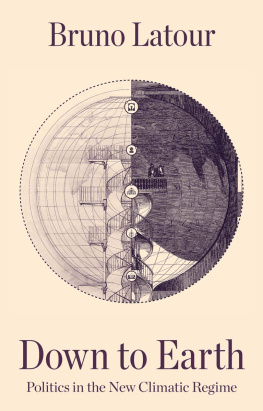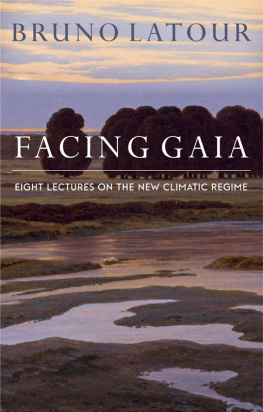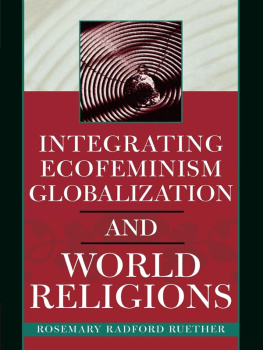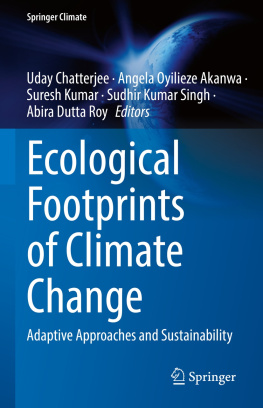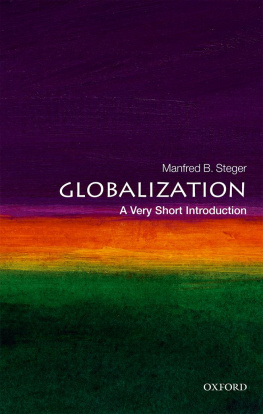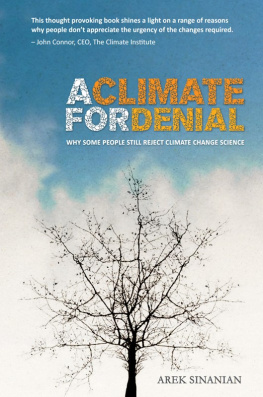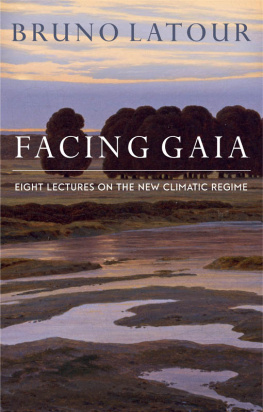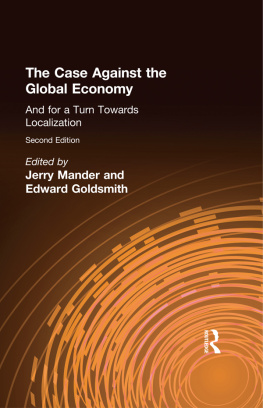Contents
Guide
Pages

Down to Earth
Politics in the New Climatic Regime
Bruno Latour
Translated by Catherine Porter
polity
First published in French as O atterir? Comment sorienter en politique ditions La Dcouverte, Paris, 2017
This English edition copyright Bruno Latour, 2018
Polity Press
65 Bridge Street
Cambridge CB2 1UR, UK
Polity Press
101 Station Landing
Suite 300
Medford, MA 02155, USA
All rights reserved. Except for the quotation of short passages for the purpose of criticism and review, no part of this publication may be reproduced, stored in a retrieval system or transmitted, in any form or by any means, electronic, mechanical, photocopying, recording or otherwise, without the prior permission of the publisher.
ISBN-13: 978-1-5095-3059-5
A catalogue record for this book is available from the British Library.
Library of Congress Cataloging-in-Publication Data
Names: Latour, Bruno, author.
Title: Down to earth : politics in the new climatic regime / Bruno Latour.
Other titles: O?u atterrir? English
Description: English edition. | Cambridge, UK ; Medford, MA : Polity Press, [2018] | Includes bibliographical references and index.
Identifiers: LCCN 2018009277 (print) | LCCN 2018025558 (ebook) | ISBN 9781509530595 (Epub) | ISBN 9781509530564 | ISBN 9781509530571 (pb)
Subjects: LCSH: Globalization--Political aspects. | Climatic changes--Political aspects. | Equality.
Classification: LCC JZ1318 (ebook) | LCC JZ1318 .L38413 2018 (print) | DDC 320.58--dc23
LC record available at https://lccn.loc.gov/2018009277
Cover illustration: Illustration originale cre par duofluo design graphique pour lexposition Globes. Architecture et sciences explorent le monde prsente la Cit de larchitecture et du patrimoine du 10 novembre 2017 au 26 mars 2018, Paris.
Droite: Coupe sur le Gorama au carr Ledoyen du jardin des Champs-lyses. Dessin paru dans LIllustration , 1846.
Gauche: Brevet dinvention et de perfectionnement de 10 ans dpos le 03.02.1825 par Charles-Franois-Paul Delanglard pour une machine appele gorama, propre ltude de la gographie. Coupe sur le Gorama Institut national de la proprit industrielle (INPI) / 1 BA1647_8
The publisher has used its best endeavours to ensure that the URLs for external websites referred to in this book are correct and active at the time of going to press. However, the publisher has no responsibility for the websites and can make no guarantee that a site will remain live or that the content is or will remain appropriate.
Every effort has been made to trace all copyright holders, but if any have been inadvertently overlooked the publisher will be pleased to include any necessary credits in any subsequent reprint or edition.
For further information on Polity, visit our website: politybooks.com
Acknowledgments
A first version of this text benefited from commentary, often quite detailed, offered by Alexandra Arnes (to whom I owe the figures), Pierre Charbonnier, Deborah Danowski, Grard de Vries, Maylis Dupont, Jean-Michel Frodon, Franois Gemenne, Jacques Grinevald, milie Hache, Graham Harman, Chantal Latour, Anne Le Strat, Baptiste Morizot, Dominique Pestre, Nikolaj Schultz, Clara Soudan, and Isabelle Stengers. I have tried to take all their comments into account.
Certain sections of this text are reproduced in LEurope seule. Seule lEurope, in Benot Hamon, Yannick Jadot, and Michel Wieworka, eds., La politique est nous (Paris: Robert Laffont, 2017), pp. 26976, and in LEurope refuge, in Heinrich Geiselberger, ed., The Great Regression (Cambridge: Polity, 2017), pp. 7887, as well as in journal articles: Propositions pour recaler nos GPS politiques, Libration, February 3, 2016, and Comment ne pas se tromper sur Trump, Le Monde, December 13, 2016.
Some of my research was carried out thanks to the project Politiques de la terre lpoque de lanthropocne, USPP-Sciences Po.
Weve read enough books. Jared Kushner
This essay uses the occasion of Donald Trumps election on November 8, 2016, to bring together three phenomena that commentators have already noted but without always seeing their connection. Thus, they fail to see the immense political energy that could be generated by drawing them together.
In the early 1990s, right after the victory over Communism symbolized by the fall of the Berlin Wall, just as some observers were claiming that history had run its course, another history was surreptitiously getting under way.
This history was initially marked by what is called deregulation, a term that has given the word globalization an increasingly pejorative cast. The same period witnessed, everywhere at once, the start of an increasingly vertiginous explosion of inequalities. These two phenomena coincided with a third that is less often stressed: the beginning of a systematic effort to deny the existence of climate change climate in the broad sense of the relations between human beings and the material conditions of their lives.
This essay proposes to take these three phenomena as symptoms of a single historical situation: it is as though a significant segment of the ruling classes (known today rather too loosely as the elites) had concluded that the earth no longer had room enough for them and for everyone else.
Consequently, they decided that it was pointless to act as though history were going to continue to move toward a common horizon, toward a world in which all humans could prosper equally. From the 1980s on, the ruling classes stopped purporting to lead and began instead to shelter themselves from the world. We are experiencing all the consequences of this flight, of which Donald Trump is merely a symbol, one among others. The absence of a common world we can share is driving us crazy.
The hypothesis is that we can understand nothing about the politics of the last 50 years if we do not put the question of climate change and its denial front and center. Without the idea that we have entered into a New Climatic Regime, we cannot understand the explosion of inequalities, the scope of deregulation, the critique of globalization, or, most importantly, the panicky desire to return to the old protections of the nation-state a desire that is identified, quite inaccurately, with the rise of populism.
To resist this loss of a common orientation, we shall have to come down to earth; we shall have to land somewhere. So, we shall have to learn how to get our bearings, how to orient ourselves. And to do this we need something like a map of the positions imposed by the new landscape within which not only the affects of public life but also its stakes are being redefined.
The reflections that follow, written with deliberate bluntness, explore the possibility that certain political affects might be channeled toward new objectives.
Since the author lacks any authority in political science, he can only offer his readers the opportunity to disprove this hypothesis and look for better ones.
Donald Trumps supporters should be thanked for having considerably clarified these questions by pressing him to announce, on June 1, 2017, Americas withdrawal from the Paris Climate Accord.
What the militancy of millions of ecologists, the warnings of thousands of scientists, the actions of hundreds of industrialists, even the efforts of Pope Francis,
By pulling out of the Paris Accord, Trump explicitly triggered, if not a world war, at least a war over what constitutes the theater of operations. We Americans dont belong to the same earth as you. Yours may be threatened; ours wont be!

